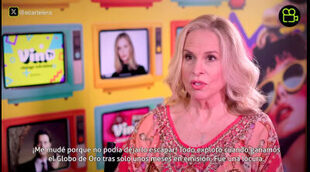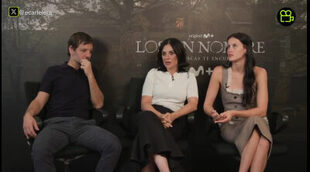Famous for his uplifting family comedies, including 'We're the Millers' and 'Daddy's Home', writer and director Sean Anders' most recent comedy takes a far more personal turn. 'Instant Family' tells the story of a married couple (Mark Wahlberg and Rose Byrne) who decide to adopt three children from the foster care system. The heartwarming story is heavily steeped in reality, inspired by Anders and his wife's own experience when they, too, decided to adopt three children.

Unlike many of Anders' popular comedies, this family film has some more serious and heart-wrenching undertones, addressing the tragic themes of family separation, isolation, and a child's basic desire to be loved.
-

-

-

-

-

-

When the couple decide to welcome fifteen-year-old Lizzy (Isabela Moner) and her two young siblings, Juan (Gustavo Quiroz) and Lita (Julianna Gamiz) into their home, they experience a brief honeymoon period before everything begins to go pear-shaped. As well as the obvious difficulties and trauma that come with this adoption process, awkward comedy and childhood laughter keeps the family afloat.
In anticipation of the release of 'Instant Family' on February 14th in the UK, we at Movie'n'Co. had the chance to speak with Sean Anders about his inspiration for the film, and about the importance of family in his own life.
Speaking to Sean Anders:
Movie'n'Co: To what extent is the story based on the real experiences of you and your wife when adopting from the foster care system?
Sean Anders: Well my wife and I adopted three kids out of the foster care system nearly seven years ago now and this story is inspired by by own story, but also the stories of a lot of the families that I met along the way and during our research process. Our story begins exactly like it begins with the characters in the movie; Mark Wahlberg makes this little offhand remark where he says "I feel like if we're going to start a family now I'm going to become an old dad, so why don't we just adopt a five year old and it would be like we'd started five years ago?" I made that joke to my wife completely innocently, I didn't mean anything, and my wife thought it was an interesting idea. It started a conversation that led us to a website and an orientation, very much like the movie. Also we went to an adoption fair, which the caregivers do in the movie, which is a real thing that happens, and, like in the movie, the teenagers were all segregated off to the side, because everyone was essentially afraid of the teenagers. We were afraid of them as well. We weren't sure we were ready to jump into kids at all, let alone teenagers, but we did wind up meeting a teenage girl at this event, who had a younger brother and sister, and we were really knocked out by her. We thought she just seemed really smart and cool and interesting, and we just decided, with a lot of fear and trepidation, to put her and her siblings on our list and we were matched with them.
Now, where the movie changes from my real life is that, in our case, after being matched with those kids, we got a call from our social workers saying that the teenage girl was really holding out hope that her mum was coming back for her and so she decided to refuse the placement because of that. Shortly after that our social worker called and said "oh there's these other three kids" and those three kids she just mentioned are now my three kids. But my kids were younger when we met them; they were 6, 3, and 18 months.
When it came to the time when I wanted to make a movie about this experience I never forgot that teenage girl, and I really wanted to include an older child in the group in the movie because there's such a need there; the teenagers are the most misunderstood and the ones people are most afraid of. So what we did, my writing partner, John Morris, and I sat down with several families that had adopted teenagers, and then we also sat down with those teenagers, some of whom were still teenagers and some of whom were grown now. We did a lot of research with those families. Then a young woman that we met through that research, named Irene, who at the time that we met her she was 19 years old... she was very impressive, she was on her we to go to UCL for college, and she gave us a lot of insight into the Lizzy character. She was with us every step of the way; she read scripts and gave notes and she travelled to Atlanta with us and was on set and was able to talk to Isabela [Moner] whenever Isabela had questions about how Lizzy would be feeling in that moment. So that's how we achieved all that. It's very close to reality; either my own reality or the reality of other people. It's all very steeped in reality.
Movie'n'Co: Pete and Ellie experience a lot of judgement from their families about their decision to adopt. Do you think that there is still a lot of stigma surrounding fostering?
S.A.: Oh yes. The Thanksgiving scene for us was really a way to get that out in the open: the kinds of things that people say when you're getting involved in foster care. A lot of times people think those things and don't say them out loud. In our experience we had people say some of those things, and later we had other people admit to us that they were thinking negative thoughts about what we were doing. And you know they were afraid for us, they were worried that we were getting involved in something that we shouldn't be getting involved in. There's a lot of stigma around kids in foster care and I think people have a lot of preconceived negative notions about who these kids are and where they come from and why they're in the system. And I think more than anything people, without really giving it any thought, people think that the kids share some of the fault and the blame for being in the system. These kids are in the system through no fault of their own, it's not anything they did wrong. And they are kids just like any other kids and they need families and they need love, and they need the support and love that we all take for granted. So it's one of the things that we wanted to make clear with this movie; we wanted to change the narrative around who these kids are and who these families are that adopt them.

Movie'n'Co: You usually write such light-hearted comedies, but here you included many darker themes. Why did you think it was important not to overlook this serious side to the foster care system?
S.A.: Every adoption story begins with some level of tragedy. With kids in foster care these situations are often tragic and there is often a level of trauma involved in it. So there wasn't really an appropriate version of this movie that was going to be a screwball comedy. But really so much of my wife and I's own experience, particularly early on, was funny, because it's such an awkward, bizarre situation to have these total strangers in your house who don't love you, and you don't love them yet, and you're trying to figure out how to be a family. So a lot of what happens is frustrating a difficult, but a lot of what happens is weirdly funny. And you have to have a sense of humour about it. So I did want to make a comedy about this topic because I feel like so many movies that are made about this topic are these deep wrenching dramas, and even though they're wonderful, honest movies, they tend to add to that stigma about these kids. We wanted to show the other side of it, where we didn't want to shy away from the trauma and the tragedy, but at the same time we did want to get into the things that are funny and heartwarming and joyful. Every family that we met with had similar stories to tell, that were either funny or heartbreaking or heartwarming, and there's a lot of joy and a lot of joyful tears in those stories.
Movie'n'Co: How did you balance the seriousness with humor? To address the important themes without undermining them with the comedy?
S.A.: Yes and no. It was not difficult in the sense that, as long as we were being honest about the feelings of the characters, the comedy would just spring from those feelings. But it was very difficult in the sense that we were putting a lot of pressure on ourselves all through the process, because I was very worried that if people felt like it was too funny or like it was making fun of kids in foster care... well that would obviously be not what I was going for. But at the same time, if it felt like the movie was too heavy or too preachy, that would undermine the story we were trying to tell and well. So really from the very first draft of the script all the way to the final tweaks at the edit bay, we were working on honing in that balance of comedy and drama. And comedy is a very subjective thing of what people find funny and what people's threshold is for comedy. And drama is actually very similar in that way. So we were just trying to really find a sweet spot in between all the way through. It wasn't really until we put it in front the first test audience, where we just got a bunch of random people in a theatre and let them see the movie... I was absolutely terrified before that screening because I just thought, "I hope we have this right". And that screening played great and they really loved it and they laughed in all the right places, and they cried in all the right places and all the hard work paid off.

Movie'n'Co: What made you decide to tell the story and what do you want the audience to take away from it?
S.A.: I work with a writing partner named
John Morris and I think he was the one who suggested it first. Every day when we get to work we just talk a little bit about what's going on in our lives and John had heard everything about every step of my story, and it was at one point that John said, "you know, I think this would make a really great movie, because everything that you've told me about how you met your kids and how you all came together..." it was all a surprise to him. He didn't know about how the process worked at all, and that was true for me too when I first got involved. John said, "you know I don't think this is something people know very much about. I think this would be an interesting story to tell."
And then we had a discussion about, since we make comedies for a living, whether this could be a comedy. And I knew right away that this could be a comedy, because I knew how funny (agonizingly funny, sometimes disturbingly funny) my own experience was.
Movie'n'Co: What would you say that family mean to you?
S.A.: Nowadays family means everything to me. I am the most comfortable, I am the most myself, I am the most fulfilled when I am around my family, and I didn't think it would be that way for me. I think I always thought I would be a dad someday, but I never really understood it in those terms. When I'm with my kids, the sense of humour that I can have and the fun that we have together, and the things that we share... I spent last weekend painting my son's bedroom, which turned out to be a much bigger job than I gave it credit for! But my son and I really had a good time painting his room for a day and a half. I could barely walk the next day...
It's where I'm at my most comfortable, it's where I'm at my most content when I'm with my family. And another thing I want people to understand about adoption and about kids who come from foster care: these kids are not my blood, I don't have a biological connection to these kids, but I love them just as much as anybody loves their kids and they've changed my life in all the same wonderful.
Movie'n'Co: Was the importance of family the core of the film in that sense?
S.A.: Yes, absolutely. I think it's a very common experience, whether you adopt children or whether you have your own biological children, or however your family comes into being, I think the steps are kind of the same. You go into it with some kind of excitement, and then some fear and trepidation, and then you have to make some really difficult adjustments to your life that you didn't expect, even though you've been hearing about these adjustments your whole life. It's not real until it's happening to you. And then you also find this great love and contentment and fulfillment from it. And all of those things are trite, because we hear about them all the time, when you're really experiencing them they're not trite at all. I did my best to make a movie to convey my own story, my own feelings of going from having a pretty good and easy life, to putting ourselves in a pretty ridiculous and difficult situation, but coming out on the other side better off than where we started.



